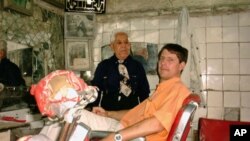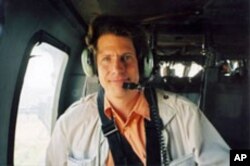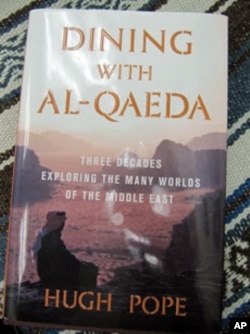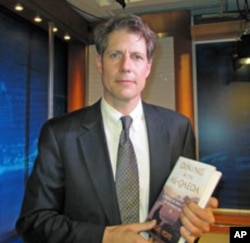Titling his book "Dining with Al-Qaeda" was no publishing gimmick for Hugh Pope.
The author actually did dine with a member of the terrorist group shortly after its September 11, 2001 attacks on the United States. Pope — then a foreign correspondent for The Wall Street Journal newspaper — had travelled to Riyadh, Saudi Arabia to learn more about the Saudi hijackers. He met with a young militant who had helped to prepare most of them for their deadly mission.
'Dining with Al Qaeda'
"I did meet a da'ia; a missionary from the camp in Afghanistan, where the Saudi young men had been before going on the mission to America, and he told me about them," says Pope. "He knew more than half of them and he called them wonderful boys because he thought they were great, of course."
The rather uncomfortable interview — during which Pope says he had to quote the Koran to persuade the missionary not to kill him — ended with a rather cordial dinner and a renewed desire on Pope's part to introduce the American public to the many worlds of the Middle East he had come to know.
"The main thing I am trying to tell them is that most journalists are honest and what you read in the newspaper is mostly right, but it is not the whole story," says Pope. "You do have to search for other sources of information to compare and think about what you are hearing and take a variety of points of view."
No one 'Islamic World'
Pope has spent more than three decades in the Middle East as a traveler, journalist and student of Arabic, Persian and Turkish languages. He says one of the most important things his experience in the region has taught him is that the Middle East is not a monolithic "Islamic World."
"I find it very bad to lump everyone together anywhere. One of my things in the book is for instance, the question of Islam. I try to avoid even using the word, because I think everybody understands something different when you say 'Islam.' I tried to show that one can't just label a country as being one thing or even the Islamic world as being one thing."
Pope points to countries that have adopted Islamic law as the basis for their legal system, but have implemented it in very different ways.
He notes, for example, that while Iran is run by a fundamentalist Islamic regime, the Iranian people he met yearn for a closer relationship with the U.S.
He also observes how secular governments in two majority Muslim countries — Egypt and Turkey — have gone in very different directions.
Unrealistic picture
"Turkey has had the great fortune of having a window to Europe and not being right next to Israel. Israel, for sure, has disrupted the progress of Egypt. I mean why did Colonel Nasser in 1952 take power in Egypt? Because of his personal experience of defeat at the hands of the Israelis (during the 1948 war) and the national sense of dislocation because of what happened with Israel," says Pope. "Unfortunately, the authoritarian streak in Egypt has not allowed the full blossoming of what Egyptians can achieve."
The author says the typical academic approach to studying the Middle East and news reports from the region are giving Americans an unrealistic and largely negative picture of its people.
"I feel that people have to stop looking at the Middle East like it is some zoo, a collection of completely incomprehensible wild animals, because we are all people. We all share the same things. The boys like fast cars and girls. It is the same everywhere. That is so missing in how the Middle East is treated in the media with all their focus on unusually horrible stories."
Social media bridge
Still, Pope is optimistic that the growing number of educated Middle Easterners using social media can convey a more accurate account of the region to the American public.
He is also pleased that President Obama is helping Americans distinguish among the many facets of the Middle East by opening the door to improved Western dialogues with the Islamic world.
A year ago, in a speech in Turkey, the president said the U.S. is not at war with Islam, and called for a greater partnership with the Muslim world. Two months later, President Obama was in Cairo, where he pledged to seek a new beginning between the United States and Muslims. Pope notes that the president has also publicly reached out to Iran for engagement.
The Middle East scholar and veteran journalist says he's hopeful that Western readers of his new book will come to see the countries of the Middle East in a new, less confrontational light, and hear more clearly the voices of its people.
"So I really hope that my book will be a source of some ideas and different points of view about what the Middle East can be."







